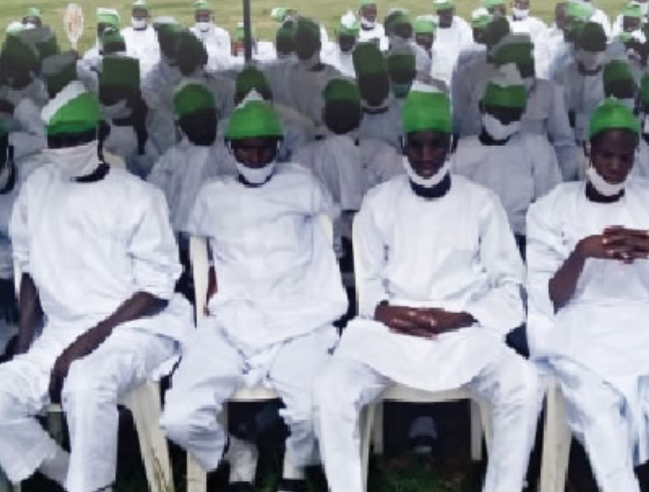Headline
How FG Spent N1.4bn On Repentant Terrorists’ Rehab Centres

The Federal Government has spent about N1.4bn for the rehabilitation of repentant terrorists and the establishment of centres for terrorism trials in the last one year and six months, PUNCH reports.
The Federal Government established the National Counter-Terrorism Centre following former President Muhammadu Buhari’s assent to the Terrorism (Prevention and Prohibition) Bill on May 12, 2022.
In December 2022, the government announced its decision to establish two disarmament, deradicalisation, rehabilitation, and reintegration centres for repentant members of Boko Haram and other terrorist groups in the country.
The Coordinator of the National Counter Terrorism Centre, Rear Admiral Yem Musa (retd.), disclosed to the House of Representatives Committee on National Security and Intelligence that the government would spend N2.4bn on the centres as part of the NCTC’s N3.8bn capital projects for 2023.
However, checks by one of our correspondents using GovSpend, a civic tech platform that tracks and analyses the Federal Government’s spending, revealed that between December 2022 and May 2024, the Ministry of Justice spent a total of N1.4bn on constructing rehabilitation centres for repentant terrorists and renovating an abandoned building for terrorism case trials.
READ ALSO: Why Only 300 Of 50,000 Hardcore Terrorists Arrested By Military Were Prosecuted – DG, NARC
On March 27, 2023, the Federal Ministry of Justice disbursed N612m to three firms for the renovation and furnishing of abandoned structures for terrorism case trials and the construction of dormitories for the rehabilitation of repentant terrorists under Operation Safe Corridor.
The first payment of N286.7m was transferred to a firm, El-haby Concept Limited, for the renovation and furnishing of abandoned building for terrorism case trials at Giwa Barracks, as approved by the Secretary to the Government of the Federation on March 21, 2023.
The second payment of N21.5m was made to Interprise Limited as consultancy fees for designing and supervising the building of facilities for repentant terrorists at the OSC. The remaining N303.7m was released to Fosab Global Energy Service Limited as an additional 40% payment for constructing the rehabilitation centre.
In 2024, the ministry paid three firms a total of N179m for similar projects. The first payment of N11.5m was wired to Jayjaysen Integrated Links Ltd on March 22, 2024, for the supply of desktop computers and LaserJet printers/toners to facilitate terrorism case prosecutions, as approved by the SGF on December 1, 2023.
Another N16.4m was transferred to Estergel Ltd on April 8, 2024, for procuring computers and accessories for the same purpose, as approved by the SGF on December 18, 2023. Finally, N151.8m was paid to Fosab Global Energy Service Ltd on May 3, 2024, as part of payment for constructing the rehabilitation centre.
READ ALSO: Viral Video: “Please Stop Crying,” Soldiers In Tears After Losing Colleagues To Terrorists
Secret trials of terrorists
Meanwhile, on December 15, the NCTC disclosed in a statement that it had secured the conviction of no fewer than 325 terrorists in its Phase 5 and Phase 6 trials at the Kainji Detention Facility.
The centre noted that the terrorists received various sentences ranging from the death penalty to life imprisonment and terms of 20 to 70 years, depending on the severity of the crimes committed by the suspects.
In the Phase 5 trial, conducted in July 2024, about 143 cases were heard, leading to 125 convictions. In Phase 6, 237 cases were heard, with 200 convictions secured at the same venue. However, the government has since remained silent on when the Phase 7 trials will commence.
When The PUNCH reached out to the Office of the Attorney General of the Federation and Minister of Justice to ascertain why the trials were conducted secretly, no response was received.
Some security experts and civil society organisations expressed divergent opinions on the secretive nature of the terrorism trials.
A security expert, Lekan Jackson-Ojo, said secret trials lacked authenticity.
READ ALSO: Why Only 300 Of 50,000 Hardcore Terrorists Arrested By Military Were Prosecuted – DG, NARC
“When politicians, armed robbers, or the so-called Yahoo boys commit offences, the press is allowed to report on it, and the entire world knows about it. But why are we trying these enemies of humanity, enemies of God—the Satanists—in secrecy?
“For over 20 years, members of the Boko Haram terrorist group have been in Nigeria, killing thousands of people and rendering millions homeless. How many of these people have been sentenced to life imprisonment?” he queried.
Chidi Omeje, another security expert, also condemned the secret trials, saying, “Why would they conduct secret trials? Does it mean the military, for example, is trying to protect these terrorists who are also killing their personnel?”
“The terrorists have killed a lot of military officers. So, why would the military participate in any action to shield their prosecution? I think it has to do with procedural issues because they are dealing with so many arrested terrorists,” he added.
However, another security expert, Kabir Adamu, argued that the government’s decision to conduct secret trials was justified for security reasons.
He said, “It is very commendable that this administration has prioritised the trial of suspects, especially those facing terrorism-related charges and who have been in detention for a very long time, some for more than a decade. However, these trials must be conducted according to standard procedures to ensure transparency and compliance with the rule of law.”
PUNCH
Headline
South Korea, Japan Protest China, Russia Aircraft Incursions

South Korea and Japan reacted furiously on Wednesday after Chinese and Russian military aircraft conducted joint patrols around the two countries, with both Seoul and Tokyo scrambling jets.
South Korea said it had protested with representatives of China and Russia, while Japan said it had conveyed its “serious concerns” over national security.
According to Tokyo, two Russian Tu-95 nuclear-capable bombers on Tuesday flew from the Sea of Japan to rendezvous with two Chinese H-6 bombers in the East China Sea, then conducted a joint flight around the country.
The incident comes as Japan is locked in a dispute with China over comments Prime Minister Sanae Takaichi made about Taiwan.
READ ALSO:China Backs Nigeria, Warns Against Foreign Interference
The bombers’ joint flights were “clearly intended as a show of force against our nation, Defence Minister Shinjiro Koizumi wrote on X Wednesday.
Top government spokesman Minoru Kihara said that Tokyo had “conveyed to both China and Russia our serious concerns over our national security through diplomatic channels”.
Seoul said Tuesday the Russian and Chinese warplanes entered its air defence zone and that a complaint had been lodged with the defence attaches of both countries in the South Korean capital.
“Our military will continue to respond actively to the activities of neighbouring countries’ aircraft within the KADIZ in compliance with international law,” said Lee Kwang-suk, director general of the International Policy Bureau at Seoul’s defence ministry, referring to the Korea Air Defence Identification Zone.
READ ALSO:Trial For South Korean Woman Accused Of ‘Suitcase Murders’ Starts Today
South Korea also said it deployed “fighter jets to take tactical measures in preparation for any contingencies” in response to the Chinese and Russian incursion into the KADIZ.
The planes were spotted before they entered the air defence identification zone, defined as a broader area in which countries police aircraft for security reasons but which does not constitute their airspace.
Japan’s defence ministry also scrambled fighter jets to intercept the warplanes.
Beijing later Tuesday confirmed it had organised drills with Russia’s military according to “annual cooperation plans”.
READ ALSO:South Korean Actress Kim Sae-ron Found Dead In Seoul Apartment
Moscow also described it as a routine exercise, saying it lasted eight hours and that some foreign fighter jets followed the Russian and Chinese aircraft.
Since 2019, China and Russia have regularly flown military aircraft into South Korea’s air defence zone without prior notice, citing joint exercises.
In November last year, Seoul scrambled jets as five Chinese and six Russian military planes flew through its air defence zone.
Similar incidents occurred in June and December 2023, and in May and November 2022.
READ ALSO:Russia Insists Ukraine Must Cede Land Or Face Continued Military Push
Meanwhile, Tokyo said Monday it had scrambled jets in response to repeated takeoff and landing exercises involving fighter jets and military helicopters from China’s Liaoning aircraft carrier as it cruised in international waters near Japan.
It also summoned Beijing’s ambassador after military aircraft from the Liaoning locked radar onto Japanese jets, the latest incident in the row ignited by Takaichi’s comments backing Taiwan.
Takaichi suggested last month that Japan would intervene militarily in any Chinese attack on the self-ruled island, which Beijing claims as its own and has not ruled out seizing by force.
AFP
Headline
Thousands Reported To Have Fled DR Congo Fighting As M23 Closes On Key City

Fierce fighting rocked the eastern Democratic Republic of Congo on Tuesday as the Rwanda-backed M23 militia rapidly advanced towards the strategic city of Uvira, with tens of thousands of people fleeing over the nearby border into Burundi, sources said.
The armed group and its Rwandan allies were just a few kilometres (miles) north of Uvira, security and military sources told AFP.
The renewed violence undermined a peace agreement brokered by US President Donald Trump that Kinshasa and Kigali signed less than a week ago, on December 4.
Trump had boasted that the Rwanda-DRC conflict was one of eight he has ended since returning to power in America in January.
READ ALSO:Ambassadorial Nominees: Ndume Asks Tinubu To Withdraw List
With the new fighting, more than 30,000 people have fled the area around Uvira for Burundi in the space of a week, a UN source and a Burundian administrative source told AFP.
The Burundian source told AFP on condition of anonymity he had recorded more than 8,000 daily arrivals over the past two days, and 30,000 arrivals in one week. A source in the UN refugee agency confirmed the figure.
The Rwanda-backed M23 offensive comes nearly a year after the group seized control of Goma and Bukavu, the two largest cities in eastern DRC, a strategic region rich in natural resources and plagued by conflict for 30 years.
Local people described a state of growing panic as bombardments struck the hills above Uvira, a city of several hundred thousand residents.
“Three bombs have just exploded in the hills. It’s every man for himself,” said one resident reached by telephone.
READ ALSO:South Africa Beat DR Congo In shootout To Finish Third At AFCON
“We are all under the beds in Uvira — that’s the reality,” another resident said, while a representative of civil society who would not give their name described fighting on the city’s outskirts.
Fighting was also reported in Runingo, another small locality some 20 kilometres (12 miles) from Uvira, as the M23 and the Rwandan army closed in.
Burundi views the prospect of Uvira falling to Rwanda-backed forces as an existential threat, given that it sits across Lake Tanganyika from Burundi’s economic capital Bujumbura.
The city is the main sizeable locality in the area yet to fall to the M23 and its capture would essentially cut off the zone from DRC control.
READ ALSO:Stampede Kills 37 During Army Recruitment In Congo Capital
Burundi deployed about 10,000 soldiers to eastern DRC in October 2023 as part of a military cooperation agreement, and security sources say reinforcements have since taken that presence to around 18,000 men.
The M23 and Rwandan forces launched their Uvira offensive on December 1.
Rich in natural resources, eastern DRC has been choked by successive conflicts for around three decades.
Violence in the region intensified early this year when M23 fighters seized the key eastern city of Goma in January, followed by Bukavu, capital of South Kivu province, a few weeks later.
– Regional risk –
The peace deal meant to quell the fighting was signed last Thursday in Washington by Congolese President Felix Tshisekedi and his Rwandan counterpart Paul Kagame, with Trump — who called it a “miracle” deal — also putting his signature to it.
READ ALSO:FULL LIST: US To Review Green Cards From 19 ‘Countries Of Concern’ After Washington Shooting
The agreement includes an economic component intended to secure US supplies of critical minerals present in the region, as America seeks to challenge China’s dominance in the sector.
But even on the day of the signing, intense fighting took place in South Kivu, where Uvira is located, which included the bombing of houses and schools.
Witnesses and military sources in Uvira said that Congolese soldiers fleeing the fighting had arrived in the city overnight Monday and shops were looted at dawn.
Several hundred Congolese and Burundian soldiers had already fled to Burundi on Monday, according to military sources, since the M23 fighters embarked on their latest offensive from Kamanyola, some 70 kilometres north of Uvira.
Since the M23’s lightning offensive early this year, the front had largely stabilised over the past nine months.
Burundian President Evariste Ndayishimiye warned in February there was a danger of the conflict escalating into a broader regional war, a fear echoed by the United Nations.
Headline
‘Santa Claus’ Arrested For Possessing, Distributing Child Sexual Abuse Material

A 64-year-old man from Hamilton Township has been arrested in the United States after investigators linked him to the possession and distribution of child sexual abuse material.
The suspect, identified as Mark Paulino, had been working as a “Santa for hire” at holiday events, a role that placed him in repeated contact with children.
Mercer County officials said the investigation began on 4 December when detectives were alerted to suspicious online activity involving the uploading of child pornography from a residence in Hamilton Township. The probe quickly identified Paulino, a retired elementary school teacher, as the person involved.
READ ALSO:Nigerian Ringleader Of Nationwide Bank Fraud, Money Laundering Jailed In US, Says FBI
Police stated that Paulino had presented himself online as a retired teacher and had recently performed as Santa Claus for photographs and private, corporate, and organisational events. “Because this role involved direct, repeated contact with children, detectives worked around the clock to secure a search warrant,” authorities explained.
The warrant was executed on 5 December, during which police seized multiple items regarded as evidentiary. Paulino was taken into custody without incident and charged with possession and distribution of child sexual abuse materials, as well as endangering the welfare of a child.
Prosecutors have filed a motion to detain him pending trial. The investigation remains ongoing, and authorities have urged members of the public with relevant information to come forward.

 Politics4 days ago
Politics4 days agoJUST IN: Tinubu Holds Closed-door Meeting With Rivers, Ebonyi Govs

 News4 days ago
News4 days agoWhy My Lineage Qualifies Me For Awujale Throne — K1 De-Ultimate

 Politics4 days ago
Politics4 days agoTinubu, Six APC Governors Hold Closed-door Meeting At Aso Villa

 News5 days ago
News5 days agoHow I and Obey’s Son Escaped Getting Caught In Benin’s Coup —Dele Momodu

 News4 days ago
News4 days agoGroup Wants Edo AG Professorship Investigated

 News4 days ago
News4 days agoGbaboyor’s Allegations Against Otuaro Baseless, Malicious — PAP Office

 Politics3 days ago
Politics3 days agoJUST IN: Fubara Dumps PDP For APC

 News4 days ago
News4 days agoStep-by-step Guide On How To Register For 2026 UTME

 News3 days ago
News3 days agoOtuaro: IPF Urges Reps To Take Caution Over Arrest Threat

 News4 days ago
News4 days agoFG Offered 4,000 Pregnant Women Free C-section – Report






























